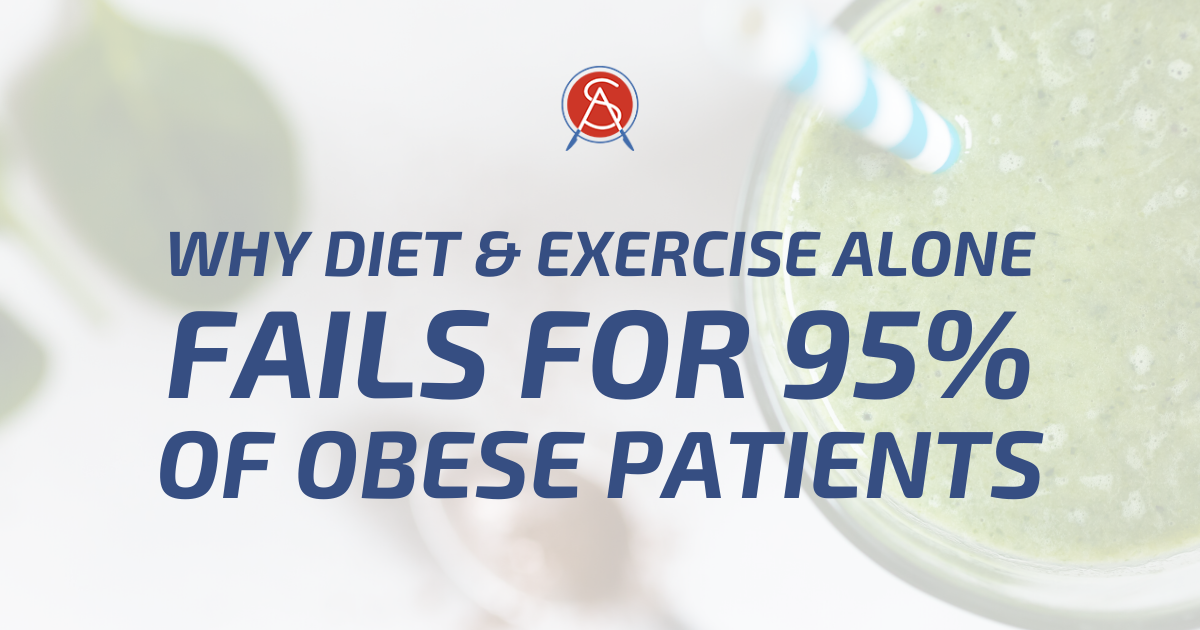If you have watched our seminar, had a consultation, or researched bariatric surgery, you will undoubtedly have come across the statistic that between 90 and 95% of obese people do not achieve long-term weight loss with diet and exercise alone. To be sure, improving one’s lifestyle in the form of better diet and exercise habits is a key component of any weight loss strategy. However, without a tool such as bariatric surgery, which is the only proven long-term weight loss solution for obese patients, most people do not get the results they want. So why are those who suffer from obesity having such a hard time losing weight?

- The first reason revolves around a relatively recent hypothesis known as the “set point.” Essentially, the body creates a specific ideal weight. This is different in all of us, but most people who do not suffer from excess weight or obesity have a set point within normal BMI range. This set point tends not to fluctuate until the patient sustains a great deal of excess weight for a long period of time. At this point, the body’s set point may rise – in other words it has become accustomed to a higher weight, greater caloric intake and so forth. Our body is very stubborn and will adapt to maintain what it considers to be an ideal (albeit higher) weight. To maintain this higher weight, the body may reduce the metabolic rate when it senses we are on a diet, casually described as “starvation mode.”
- But another often overlooked reason for the lack of weight loss over the long term — even when dieting and exercising – is simple…why we are dieting. Sustainable weight loss, whether part of bariatric surgery or not, requires the patient to truly want to change their lifestyle. This may sound like a given, but most of the time we seek change because of external forces, not our own decisions. In the case of excess weight, outside factors may include the associated stigma, or the fact that family members and friends have encouraged us to lose the weight. While these are all powerful reasons, they are reactions to other people’s wants and beliefs rather than our own. Our most successful bariatric patients want to lose weight for themselves, to improve their lifestyle for their own enjoyment and live more fully. While supportive words from family and friends are not only necessary, but encouraged, the decision is ultimately up to the patient themselves. It’s interesting to hear the reasons our patients have for considering bariatric surgery. They usually revolve around a moment or specific realization that is far deeper than “I want to look better” or “I want to move faster.”
- Lastly, excess weight – especially levels reaching obesity — can change the ways in which our bodies function. White fat – the dangerous, hard-to-get-rid-of kind – that accumulates around our waist, can actually cause hormonal changes in the body that not only make it more difficult to lose weight, but can also cause related problems.
While some are successful in fighting their own bodies over the long-term, and ultimately achieving sustainable weight loss, that number represents only about 5 to 10% of obese patients.
So, What Can Be Done?
Of course, diet and exercise must be a part of everyone’s weight loss routine whether they decide surgery is right for them or not. In fact, a history of unsuccessful weight loss programs, as well as participation in medical weight loss, is a requirement of most insurance companies for surgical approval. For those who have serious comorbidities, such as poorly controlled diabetes, joint problems, high blood pressure, high cholesterol and sleep apnea, bariatric surgery is an option to consider. While surgery may seem like a drastic choice, the fact that 300,000+ people die every year from obesity-related complications shows that surgery really can be a viable option for those that qualify.
It is important to remember that, while diet and exercise alone are often unsuccessful in long-term weight loss for obese patients, bariatric surgery cannot offer its full potential without a patient embarking on a new and improved lifestyle that includes stricter eating habits and regular exercise. To put it best, we like to say that surgery is only a tool to allow the patient to change their lifestyle more quickly, more easily, and more effectively.
If this all seems daunting, you’re not alone. Making the decision to research bariatric surgery is undertaken by only a small number of people. However, it is important to remember that your bariatric team will be by your side throughout the process, and that doesn’t stop on the day of surgery. Bariatric surgery is a long-term commitment both for you and us — and we take our responsibility very seriously. Our office and team will be available to you long after surgery is performed, and we will be your partner in your postoperative life, every step of the way.
To learn more about whether bariatric surgery makes sense for you and how it may finally get you off the frustrating cycle of losing and regaining weight through diet and exercise alone, we encourage you to watch our online seminar, at which point you can schedule a consultation and get started on the road to improved health.









